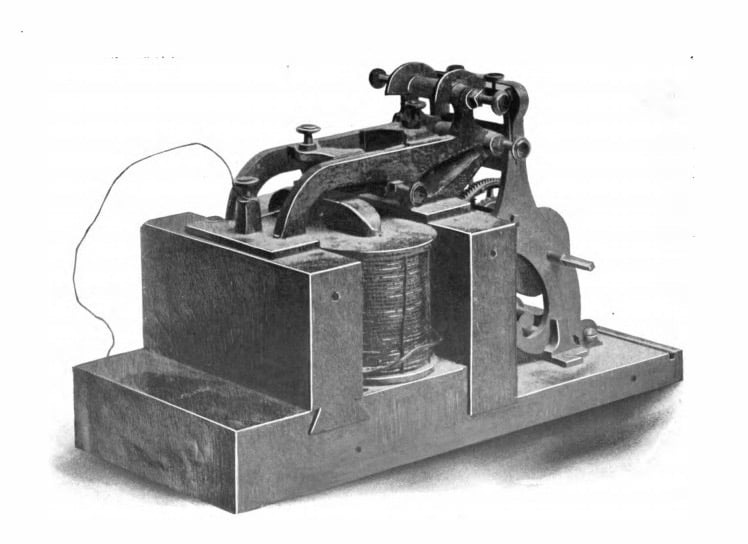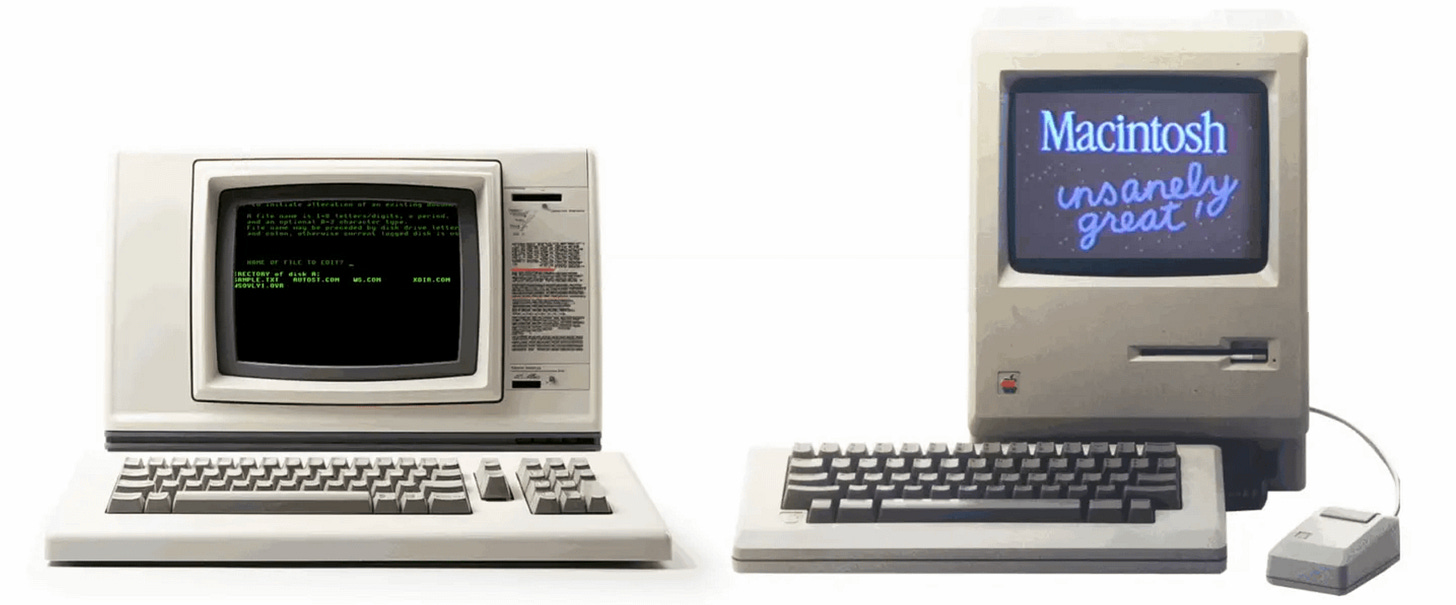Why Steve Wozniak Dismissed PCs and Steve Jobs Didn't
In March 1976 Apple Co-Founder Steve Wozniak presented a circuit board design for a home PC at the now legendary ‘Homebrew Computer Club’ - a meeting of early personal computing pioneers.
In attendance was a young Steve Jobs who - so struck by the projects potential - convinced Wozniak to keep the designs private and co-found Apple to commercialize them. The rest was history.
Often forgotten in this Silicon Valley legend was the doubt one of the Steve’s (Steve Wozniak) cast on the very idea of personal computing, just as the companies magnum opus - the Macintosh - had been released to the world.
In a 1985 interview Wozniak posited: “The home computer may be going the way of video games, which are a dying fad” - alluding to the 1983 crash in the video game market. Wozniak continued:
“for most personal tasks, such as balancing a check book, consulting airline schedules, writing a modest number of letters, paper works just as well as a computer, and costs less.”
Even in the realm of education Wozniak doubted the value of computers, saying that after leaving Apple and enrolling in college: "
I spent all my time using the computer, not learning the subject I was supposed to learn. I was just as efficient when I used a typewriter."
He seemed well aware of the heretical nature of his statements, telling a reporter: “Nobody at Apple is going to like hearing this, but as a general device for everyone, computers have been oversold” and that “Steve Jobs is going to kill me when he hears that.”
Many of his critiques were not uncommon: the same year The New York Times ran a story titled 'Home Computer is Out in the Cold' exploring the failed promise of computers becoming as ubiquitous as television and dishwashers in the home. In the piece Silicon Valley luminary Esther Dyson joked “What the world needs is a home computer that does windows” - she meant housework, not the operating system that would launch 8-months later.
Apple CEO John Sculley - who’d infamously force Steve Jobs out of his own company later that same year - would conclude:
''A lot of myths about computers were exposed in 1984. One of them is that there is such a thing as the home computer market. It doesn't exist. People use computers in the home, of course, but for education and running a small business. There are not uses in the home itself.''
Another person quoted in the piece, Dan Bricklin - co-inventor of spreadsheet software (VisiCalc) - said ''What everyone is missing is that it has to be both convenient and cheap” — alluding to computer pioneer Alan Kay’s 1972 vision for “Dynabook” - an iPad like device connected to central databases (what we now call the internet.) Bricklin would quip:
“You are not going to go upstairs just to type in a quick query and get back an answer.''
John Sculley would eventually concur with Bricklin and Alan Kay, in the proceeding years Apple would begin work on handheld connected computers, first via a group of Macintosh engineers that would spin off the company ‘General Magic.’ Then via the “Newton” an early PDA and precursor to the iPhone.

It turns out even Steve Jobs agreed with broader assessments of the limited appeal of the PC market - but crucially - only in the micro. In a 1985 Playboy interview Jobs would admit the home PC market was: “more of a conceptual market than a real market.”

However, Jobs insisted that something big was coming - alluding to a nascent “nationwide communications network” that would be “a truly remarkable breakthrough for most people, as big as the telephone” and make computers “essential in most homes.”
Playboy: What will change?
Steve Jobs: The most compelling reason for most people to buy a computer for the home will be to link it into a nationwide communications network. We’re just in the beginning stages of what will be a truly remarkable breakthrough for most people—as remarkable as the telephone.
Jobs was right. You’re using such a network right now on a personal computing device. It turned out people would be willing to “go upstairs just to type in a quick query and get back an answer” if the world’s knowledge was at their fingertips.
Macro Pessimism v. Macro Optimism
What separated the two Steve’s is Wozniak was a pessimist in the micro and the macro, while Jobs was staunchly optimistic in the macro, about the larger idea of personal computing and only doubted the mass appeal in the current form - much like Alan Kay, Dan Bricklin and eventually John Sculley.
The problem with macro optimism? It is speculative in nature, it is vague and sounds pie-in-the-sky (and much of it inevitably is) - on the other hand micro pessimism is specific and grounded in current reality. Steve Jobs would articulate this in response to Playboy probing if he was expecting people to act on pure faith when investing in a home PC:
Playboy: Then for now, aren’t you asking home-computer buyers to invest $3000 in what is essentially an act of faith?
Steve Jobs: …the hard part of what we’re up against now is that people ask you about specifics and you can’t tell them. A hundred years ago, if somebody had asked Alexander Graham Bell, “What are you going to be able to do with a telephone?” he wouldn’t have been able to tell him the ways the telephone would affect the world. He didn't know that people would use the telephone to call up and find out what movies were playing that night or to order some groceries or call a relative on the other side of the globe.
Jobs would go on to cite the early days of the telegraph when short term optimists predicted a “telegraph on every desk” - overlooking the impracticality of learning morse code. He’d point out that personal telegraphy machines didn’t have mass consumer appeal, not because electronic messaging was unappealing to consumers but because its early form factor was unappealing.

His broader point: Being pessimistic about the mass consumer appeal of home based telecommunication in the form of telegraph machines was accurate - in the micro - however, applying that to telecommunication in the macro would have been a mistake because eventually the telephone, cellphones and texting would emerge. He’d posit that the recent advent of the graphical user interface via the Macintosh was a similar leap in usability and would similarly increase consumer demand.
Playboy wasn’t convinced:
Playboy: Is that really significant or is it simply a novelty? The Macintosh has been called “the world’s most expensive Etch A Sketch” by at least one critic.
Jobs: It’s as significant as the difference between the telephone and the telegraph.
Early iterations of breakthrough technologies are often extremely limited and it is easy to think those limits will persist, our previous dive into early reactions of the Wright Brothers Flier is a good example (we called it ‘Beta Bias’)
Extrapolating something like the jumbo jet in response to critiques of the Flier would have sounded polly-annish to critics of that early implementation of manned flight. As would prognosticating image based user interfaces at the advent of command line computers, or an information network at the advent of user interfaces as jobs did in Playboy. When asked to elaborate on that particular prediction Jobs would say:
“I can only begin to speculate. We see that a lot in our industry: You don't know exactly what's going to result, but you know it's something very big and very good.”
What he was describing was macro optimism.
BETA BIAS
The broader lesson here is not to judge emerging technologies - especially breakthrough ones - on early form factors and limitations. Micro pessimism is often grounded in reality, but reality changes - especially in the context of technological development. While no one can be sure how new technologies will improve and evolve, we can be sure that they will thanks to that invisible force driving technological progress: human intelligence, ingenuity and creativity.








> I spent all my time using the computer, not learning the subject I was supposed to learn. I was just as efficient when I used a typewriter.
Well, admittedly, that's still a problem with computers.
The Vision Pro is going through a Beta Bias phase